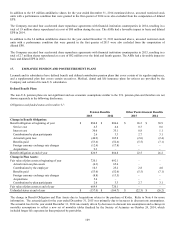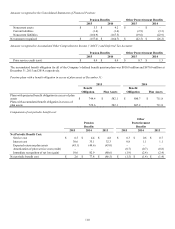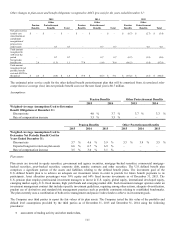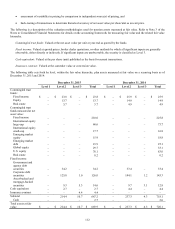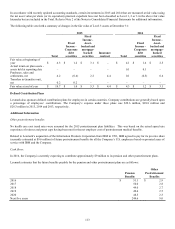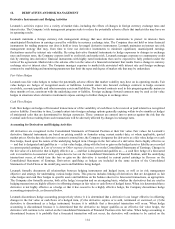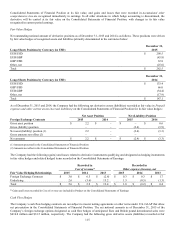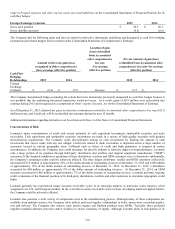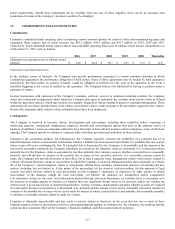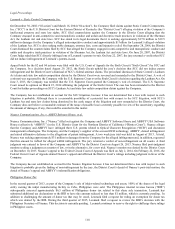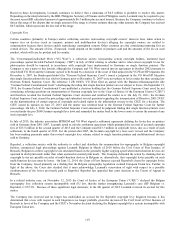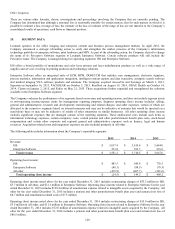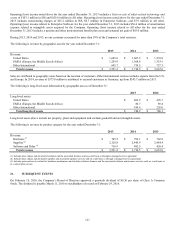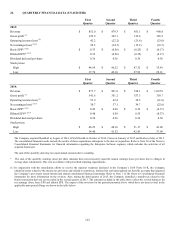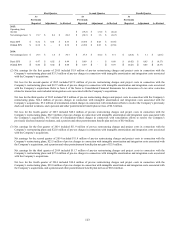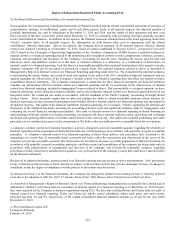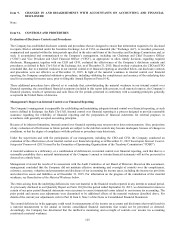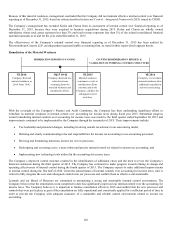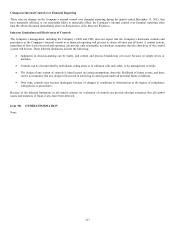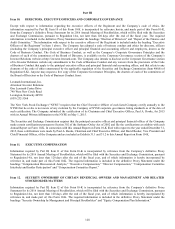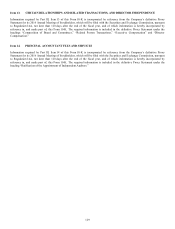Lexmark 2015 Annual Report Download - page 123
Download and view the complete annual report
Please find page 123 of the 2015 Lexmark annual report below. You can navigate through the pages in the report by either clicking on the pages listed below, or by using the keyword search tool below to find specific information within the annual report.
119
Based on these developments, Lexmark continues to believe that a minimum of $0.5 million is probable to resolve this matter.
Depending on the interpretation by the BIR, Philippine Secretary of Finance and/or Philippine courts, Lexmark may be required to pay
the most recent BIR calculated amount of approximately $6.5 million plus accrued interest. Because the Company continues to believe
that at this stage of the dispute that no single amount of the range is a better estimate than any other amount, the Company has accrued
$0.5 million, which represents the low end of the range.
Copyright Fees
Certain countries (primarily in Europe) and/or collecting societies representing copyright owners’ interests have taken action to
impose fees on devices (such as scanners, printers and multifunction devices) alleging the copyright owners are entitled to
compensation because these devices enable reproducing copyrighted content. Other countries are also considering imposing fees on
certain devices. The amount of fees, if imposed, would depend on the number of products sold and the amounts of the fee on each
product, which will vary by product and by country.
The VerwertungsGesellschaft Wort (“VG Wort”), a collection society representing certain copyright holders, instituted legal
proceedings against Hewlett-Packard Company (“HP”) in July of 2004 relating to whether and to what extent copyright levies for
photocopiers should be imposed in accordance with copyright laws implemented in Germany on single function printers. The
Company is not a party to this lawsuit, although the Company and VG Wort entered into an agreement in October 2002 pursuant to
which both VG Wort and the Company agreed to be bound by a decision of the court of final appeal in the VG Wort/HP litigation. On
December 6, 2007, the Bundesgerichtshof (the “German Federal Supreme Court”) issued a judgment in the VG Wort/HP litigation
that single function printer devices sold in Germany prior to December 31, 2007 were not subject to levies under the then existing law
(German Federal Supreme Court, file reference I ZR 94/05). VG Wort filed an appeal with the Bundesverfassungsgericht (the
“German Federal Constitutional Court”) challenging the ruling that single function printers are not subject to levies. On September 21,
2010, the German Federal Constitutional Court published a decision holding that the German Federal Supreme Court erred by not
considering referring questions on interpretation of German copyright law to the Court of Justice of the European Union (“CJEU”)
and therefore revoked the German Federal Supreme Court decision and remitted the matter to it. On July 21, 2011, the German
Federal Supreme Court stayed the proceedings and submitted several questions regarding the interpretation of Directive 2001/29/EC
on the harmonization of certain aspects of copyright and related rights in the information society to the CJEU for a decision. The
CJEU issued its opinion on June 27, 2013 and the matter was remitted back to the German Federal Supreme Court for further
proceedings. On July 3, 2014, the German Federal Supreme Court announced its judgment finding that single function printers were
covered under the pre-2008 German copyright levy laws and remanded the matter back to the lower courts to assess the amount of any
such copyright levy.
In July of 2015, the industry association BITKOM and VG Wort signed a settlement agreement defining the levies due on printers
sold in Germany from 2001-2007. Lexmark opted to join the settlement agreement which prompted the reversal of accrued copyright
fees of $23.5 million in the second quarter of 2015 and the Company paid $23.3 million in copyright levies, due as a result of such
settlement, in the fourth quarter of 2015. For the period after 2007, the German copyright levy laws were revised and the Company
has been making payments under this revised copyright levy scheme related to single function printers and multifunctional devices
sold in Germany.
Reprobel, a collection society with the authority to collect and distribute the remuneration for reprography to Belgian copyright
holders, commenced legal proceedings against Lexmark Belgium in March of 2010 before the Civil Court of First Instance of
Brussels, Belgium to collect copyright levies calculated based on the generally higher copying speed when multi-function devices are
operated in draft print mode rather than when operated in normal print mode. The Company defended the action by claiming that no
copyright levies are payable on sales of multi-function devices in Belgium or, alternatively, that copyright levies payable on such
multi-function devices must be lower. On June 12, 2014, the Court of First Instance rejected Reprobel's claim for copyright levies
from the Company, based primarily on a finding that the Belgian reprography legislation violated European Union law. Further, in
light of the above, the Court also decided that it must acknowledge Lexmark's reservation of right with respect to a possible
reimbursement of the levies previously paid to Reprobel. Reprobel has appealed that court decision to the Courts of Appeal in
Brussels.
In a related industry case, on November 12, 2015 the Court of Justice of the European Union (“CJEU”) declared the Belgian
reprography levy collection system incompatible with EU law, thereby further strengthening Lexmark’s case (HP Belgium vs.
Reprobel, C-572/13). Because of these significant legal decisions, in the 4th quarter of 2015 Lexmark reversed its accrual for this
matter.
The Company has reversed and no longer has established an accrual for the Reprobel copyright levy litigation because it has
determined that a loss with respect to such litigation is no longer probable given the decision of the Civil Court of First Instance of
Brussels in favor of the Company and the CJEU’s November decision declaring the Belgian copyright levy system incompatible with
European Union law.


